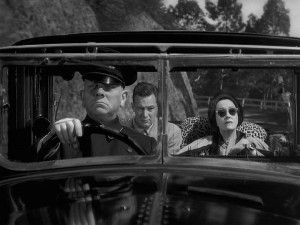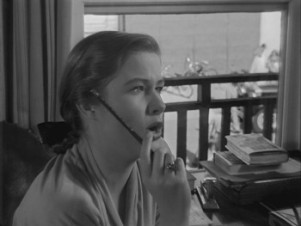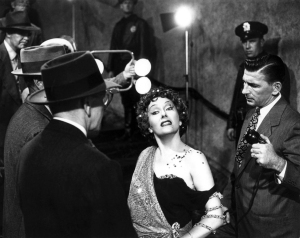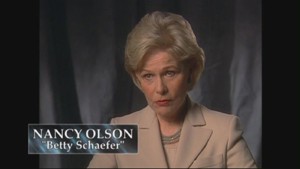
 |
|
|
|
"There's the famous moment that Louis B. Mayer became absolutely incensed and went up to Billy and said, 'How can you do this to your own people, to our industry?" ... And Billy had a famous retort that I cannot, uh, quote, but he said something like oh, you know, go something to yourself." When Hollywood made a movie about itself, the result was often an overheated soap opera. Two excellent versions of A Star is Born certainly capture the glory of Movie Land, but the norm is best represented by the embarrassing The Oscar, a serious effort now regarded as a camp hoot. Billy Wilder's sublime Sunset Blvd. took years to be acknowledged as a masterpiece, an acid look at the way tinsel town disposes of its own heritage. When new it was pilloried by the studio moguls who still ran the business. It's said that MGM's Louis B. Mayer tried to interest other studio bigwigs in buying the negative and destroying it! Paramount's Centennial Edition DVD of Sunset Blvd. is a new and improved encoding of one of the best Hollywood movies ever made. We'd have preferred an upgrade to Blu-ray, but some very good featurettes make the new release well worth viewer attention. 
Sunset Blvd. (that's the title spelling on the film itself) is the story of Joe Gillis (William Holden), an unemployed writer who ducks into the wrong Brentwood driveway and finds himself jumping twenty-five years into the past. The reclusive Norma Desmond (Gloria Swanson) is a former silent movie great with delusions of making a comeback. Sheltered and indulged by her once-director, now butler Max Von Mayerling (Erich von Stroheim), Norma lives in a wealthy fantasy world. Thinking that he'll pick up some easy money while dodging the auto repo men, Joe plays along with Norma's scheme to rewrite Salome as a starring vehicle. He grossly underestimates Norma's possessiveness. Although Joe falls in love with studio reader Betty Schaefer (Nancy Olson), he cannot escape the jealous Norma. By 1950 Billy Wilder was experimenting with Noirs even darker than his breakthrough smash Double Indemnity. Sunset Blvd. is a mordant black comedy but also a stirring appreciation of Hollywood's glorious silent past. The basic idea came from Billy Wilder's writing partner Charles Brackett, perhaps after reading James Agee's famous articles on silent comedians. It's hard to believe, but to mainstream America in the 1940s, silent movies were already considered obscure ancient history. Just a year or two before, the industry had almost ignored the funeral of screen pioneer D.W. Griffith. Gloria Swanson was barely in her fifties and nothing like the delusional Norma Desmond, but she was well aware of the significance of Wilder's project. Some previous silent stars did indeed languish in denial, dreaming of career comebacks. Sunset Blvd. is as funny as any Hollywood satire, with little in the way of exaggeration. Agents and producers worry about their golf scores and seem to enjoy watching freelance writer Joe Gillis beg for a job. In the classed society of the studios, a big man like Cecil B. DeMille is attended like a baron while young script readers and assistant directors celebrate with pizza & beer parties. After he becomes entangled in the affairs of Norma Desmond, Joe is uncomfortable around his buddy Artie Green (Jack Webb, in his best film performance). Making matters worse, Joe's also dating Artie Green's girlfriend. Betty's enthusiasm should make Joe feel that he could succeed as a screenwriter, but he's already become too dependent on the comforts of living with Norma. Few movies have communicated so well the self-loathing of a man who surrenders his ethics. Joe allows himself to become a passive gigolo with the self-deception that he's taking advantage of Norma. The movie has a sickly feeling, from the rot of Norma's crumbling mansion to the way Joe realizes that he's become too tainted to allow himself to "infect" the wholesome Betty Schaefer, with whom he might have formed the perfect screen writing team. 
The themes of despair and moral decay are definitely Noir, but what Sunset Blvd. resembles most is a Gothic horror film. The "undead" Norma Desmond entices Joe Gillis away from the land of the living, to share her waxwork fantasy of a bygone age. Like one of Dracula's minions, Joe is only the latest in a succession of victims that include a chimpanzee (!) and an ex-film director. Max the Butler fabricates phony fan letters, feeding Norma's fantasy the way one of Dracula's helpers might provide fresh supplies of blood. Norma controls and manipulates Joe with her forceful personality. In no time at all he's yielding to her will on every subject. Joe thinks he's a tough guy and can walk out whenever he likes, but he's fooling himself. Perhaps the only scene that Sunset Blvd. stretches things too far is in the "waxworks" bridge game with the silent greats Anna Q. Nilson, H.B. Warner and Buster Keaton. That crowd would probably make for a lively, fun party, but Wilder uses them to complete his movie star / living dead analogy. The silent stars' images remain youthful in classic films, while their living bodies age. The movies eventually turn actors into celluloid ghouls -- the fantasy outlives the reality. Wilder's casting helped define William Holden's screen image. He's boyishly charming but also a man fed up with the rat race. Holden was well aware going into the film that his career was in a dangerous slump, and Sunset Blvd. put him on the road to becoming a top star. Gloria Swanson is almost too young to play Norma, and must distort her face to embody the grotesque aspects of the deluded diva. She's loathsome and pitiable at the same time. 
Swanson retired from films gracefully and invested her money with care. Erich von Stroheim is the personality with the fiery career. Director Stroheim's fights with studio heads resulted in his expulsion from Hollywood, and he retreated to acting, mostly in foreign films. His fanaticism for the movies was inseparable from his perverse outlook on life. Max Von Mayerling's accented voice and perpetual scowl make a bigger impact than the mad doctors of the Universal Horror movies. The finale affords Stroheim the ability to direct again, ordering the newsreel cameras to record Norma's "big" close-up and descent into madness. The final image, a gauzy, glamorous nightmare, may be Billy Wilder's most impressive film conclusion. Charles Brackett initiated Sunset Blvd. but found many of Wilder's ideas harsh and distasteful. They split up afterwards, ending one of the most successful writing collaborations of the movies. Wilder moved on to really let his cynicism run free with the utterly misanthropic Noir Ace in the Hole. When it became an almost total failure (dubbed by the press, "Ass in the Wringer"), Wilder turned over a new leaf. He returned to safer, more conventional comedies -- with a cynical undertone. Paramount's two-disc Centennial Edition DVD of Sunset Blvd. is an improvement on the 2002 Special Collector's Edition. The appropriately darker and smoother encoding preserves some of the "silver screen" sheen of original prints. The fact that the feature doesn't share disc space with added value extras probably adds to the bit rate. We'd be happier if Paramount were releasing its classics to Blu-ray, but fans will probably be satisfied with this new disc's improved slate of extras. Ed Sikov's academic commentary has been carried over from the previous release, as have several of the old featurettes. The interactive Hollywood locations map is here along with pieces on composer Franz Waxman and costume designer Edith Head. Ditto the text extra that presents two script versions of the jettisoned "morgue" prologue, accompanied by outtakes found in the Paramount stock film library -- shots of the morgue truck pulling up to the dock, and a toe tag being wired to the foot of a corpse. 
The old making-of docu is gone, replaced by at least eight new widescreen-enhanced featurettes from the respected Laurent Bouzereau. Old 2002 interviews with Glenn Close, A.C. Lyles, Nancy Olson, Andrew Sarris and Ed Sikov have been re-edited to better effect and augmented with on-camera contributions from Linda Harrison, Nicholas Meyer, Stephanie Powers and Joe Wambaugh. The featurettes must recycle 50% of the film in clips but still provide an entertaining and in-depth look at Billy Wilder's masterpiece. Joseph Wambaugh is enlisted to assess the movie as a Film Noir, but instead looks at it from the viewpoint of a Hollywood policeman, adding his own list of favorite moments. The still-beautiful Nancy Olson discusses the industry's ambivalent attitude toward Billy's controversial movie. Two years later, MGM's The Bad and the Beautiful may have been produced as a direct rebuttal to Sunset Blvd.. The behind-the-camera tale characterizes writers and actors as ungrateful children who need the guidance of smart producers and wise (and unseen) studio heads. Gloria Swanson's personality is discussed by her granddaughter Brooke Anderson and actress Linda Harrison, who played opposite Ms. Swanson in an Airport movie. A brief tribute is offered for William Holden, while the producer of a re-recording of the Waxman score gets a featurette to himself. A.C. Lyles is the main contributor to a history of the Paramount lot that begins with Adolf Zukor and his nickelodeons in New York City. A look at the Los Angeles locations doesn't use modern comparisons, as most of the filming sites, including Schwab's Drugstore, have been gone for decades. Nancy Olson suggests the charm of Billy Wilder but none of the extras can really show what an aggressively funny, mischievous man he was. Wilder's unequalled wit is the highpoint of several biographies, and his unmatched skill with a dirty joke is legendary.
On a scale of Excellent, Good, Fair, and Poor,
Sunset Blvd. rates:
Reviews on the Savant main site have additional credits information and are often updated and annotated with reader input and graphics.
Review Staff | About DVD Talk | Newsletter Subscribe | Join DVD Talk Forum |
| ||||||||||||||||||